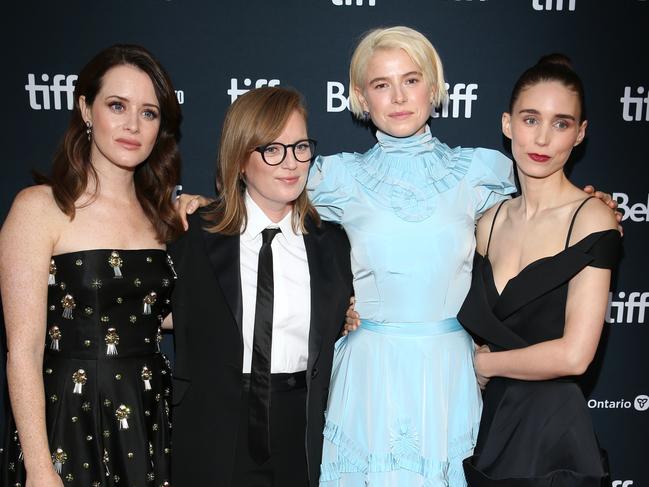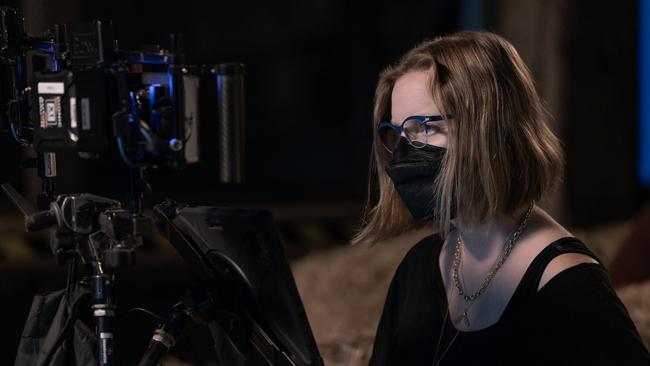With two Oscar nominations, director Sarah Polley’s provocative movie has everyone talking
Despite the challenging topic of her movie Women Talking, director Sarah Polley explains why she pushed ahead.
SmartDaily
Don't miss out on the headlines from SmartDaily. Followed categories will be added to My News.
Canadian director Sarah Polley says she’s having “an embarrassing amount of fun” doing the rounds this movie awards season.
The former actor, who starred in movies including Go, Dawn Of The Dead and Splice before switching to the other side of the camera more than a decade ago, has been on the road for the past few months with her new drama Women Talking, which has been nominated for the Best Picture Oscar as well as Best Adapted Screenplay for Polley’s script.
“I feel like I should be judging myself for the amount of sheer joy and fun,” says Polley, whose directing credits include Away From Her, Take This Waltz and the documentary Stories We Tell.
“I’ve lived my life very cynical about these things and I think when you just decide to be enjoying wherever you are, you start to see what a privilege it all is. And, in general in those rooms, I’m getting to meet such interesting people and filmmakers I admire.”

One unlikely highlight came courtesy of the Boston Society of Film Critics who awarded Polley’s stars including The Crown’s Claire Foy, The Girl With the Dragon Tattoo’s Rooney Mara and four-time Academy Award winner Frances McDormand the Best Cast Award. In a dead heat for the prize was Johnny Knoxville and his crew of thrillseeking knuckleheads for Jackass Forever, a decision that delighted Polley.
“I loved it,” Polley laughs. “It was totally brilliant and I felt seen in terms of my aesthetic as an audience. I do go see movies like Women Talking, but I’ll definitely also go and see Jackass Forever. I felt validated.”
Joking aside, Polley is also grateful that the awards chatter has given a spotlight to the sometimes confronting content of Women Talking.
Based on Miriam Towes’s 2018 book of the same name it tells the story of a group of women in an isolated Mennonite community in modern rural America, who are denied basic rights and education and routinely subjected to physical and sexual abuse from the men.
When some of the men are arrested for their crimes – and the rest leave to try to free them – the women are faced with a stark choice before they return: Stay and do nothing, fight or leave.
For two days, female representatives gather in a barn to debate their plight and how to reconcile their choice with their faith and the possibly fatal consequences.
“I thought it was just such a thoughtful, provocative and challenging work about what real democracy might look like and about how do we start a better way forward instead of just tallying up what harms have been done?” says Polley of Towes’s book.

“And how a group of people who don’t agree with each other on some things find a way to work together through something so enormous. I just found it so exciting, the idea of finding the best actresses I possibly could and putting them in a room to have that conversation.”
Women Talking is arriving on screens hot on the heels of the Taliban banning women from university in Afghanistan but Polley says such treatment is not just the purview of religious fundamentalists, nor is the film a reaction to the MeToo movement.
“The book was written before MeToo and, sadly, this story is timeless and it applies to so many cultures in so many communities, including our own secular society and this institutional and societal complicity with ongoing abuse and negation of people’s existence,” she says.
“It’s happening in so many parts of the world right now.”
While Polley was always keen to adapt the book for the screen, she was initially hesitant to undertake the monumental task of directing it too.
Not only did she have three young children, she’d also suffered a serious concussion seven years ago, leaving her with nausea, headaches and sensitivity to noise and light.

Though she’d overcome the condition, she was concerned that directing her first film for a major studio might be too much.
“I was worried,” she admits.
“I just didn’t know if the unbelievable stress and need to multitask with this film might set me back. But I didn’t have any symptoms at all. I was totally fine.”
McDormand, who had optioned the rights to the book and served as producer, also used her clout to create a working environment whereby Polley could direct and also see her children. But there was a catch – because Women Talking was filmed in Canada while Covid restrictions were still in place, Polley had to cast her children as extras for them to be together.
For a former child actor, who in recent years had been very vocal about the effects that the demands of movie sets can have on the young, it was a difficult decision.
“I was very conflicted about it,” she says.
“I made a speech every day to those kids on set saying: ‘If you want to leave, if you’re at all uncomfortable, if you’re bored, you don’t have to stay – your experience is absolutely the priority today’. We were very conscious of that.
“But, of course, having my kids on a set brought up all kinds of stuff for me that was odd.”
And how did they go?
“They loved it, apparently,” she says, before adding with a laugh, “but talk to them when they are 40 and we will get the truth.”
Women Talking is in cinemas February 16.
More Coverage
Originally published as With two Oscar nominations, director Sarah Polley’s provocative movie has everyone talking




